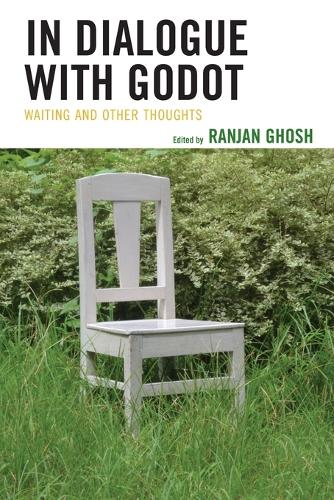
In Dialogue with Godot: Waiting and Other Thoughts
(Paperback)
Publishing Details
In Dialogue with Godot: Waiting and Other Thoughts
By (Author) Ranjan Ghosh
Contributions by Graley Herren
Contributions by Mark S. Byron
Contributions by Mary Catanzaro
Contributions by Tom Cousineau
Contributions by Stephen Barker
Contributions by Paul Sheehan
Contributions by Art Horowitz
Contributions by Eyal Amiran
Contributions by Maria Margaroni
Bloomsbury Publishing PLC
Lexington Books
26th March 2015
United States
Classifications
Professional and Scholarly
Non Fiction
Literary studies: c 1900 to c 2000
842.914
Physical Properties
Paperback
236
Width 153mm, Height 228mm, Spine 18mm
354g
Description
In Dialogue with Godot: Waiting and Other Thoughts, Ranjan Ghosh puts together thirteen new essays on Becketts most popular and widely read play, Waiting for Godot. Chapters are envisaged as dialogues with Godot, keeping in mind the event of waiting and other issues related to this Godot-Waiting phenomenon. The merit of this book lies in exploring this play from thirteen fresh perspectives introducing some important themes that have not been dealt previously. Contributors explore the play in reference to topics as varied as Hindu philosophy, Agamben, Kristeva, Derrida, the absence of women in the play, Aristotleanism in structural reading, and anti-existentialism. Essays ask, can we make claims to read this play outside the absurd tradition Is it an anti-existential play Can Beckett possibly be Indianized How can the dialectic between waiting and delay be problematized If Beckett was up to de-structure conventional modes of drama-writing, what connection could he possibly have with Aristotle and his normative modes Can the Vladimir-Estragon relationship be critiqued psychoanalytically Can questions of political commitment be challenged anew, resisting easy propositions to considering it a Resistance play Can the Godot / Resistance collocation be examined through torture (the series of beatings that structures the play), through relationship (the pseudo-couple), and finally through language (the insistent coupling of violence and meaning) In Dialogue with Godot offers a refreshingly new and varied approach to Samuel Becketts most popular play.
Reviews
Ghosh has assembled 13 outstanding essays that review Beckett's most popular drama. The volume's contributors engage the play in meaningful contexts that have important implications for performance, production, and scholarship. Standout essays explore the political contexts of site-specific productions in Sarajevo and post-Katrina New Orleans; the affinities and contrasts of Godot to classical Greek tragedy; Beckett and allegory; and the psychodynamics of friendship and coupling. Beckett's attempt to redefine theater in postwar Europe is also explored, as are the ways in which Beckett's experiences in the French resistance suffuse this play and his other postwar writing. The essays contemplate the drama within a range of political and philosophical contexts, including issues of torture and human rights, Marxist and psychoanalytic thought, philosophical reflections on the eternal return, Aristotle's Poetics, poststructuralism, and Hindu philosophy. Taken together they shed contemporary light on this drama in ways that are suggestive for actors, directors, and scholars, and provide valuable insights into the criticism and practices of this most popular of Beckett's plays. Summing Up: Highly recommended. Upper-division undergraduates through faculty and professionals. * CHOICE *
Godots 'Underground Ancestry,' 'Vladimirs Tragic Recognition,' 'The Feminine' in play, motifs of 'Speculation' and 'Infantile Politics,' editors Ghoshs own placing the theme of work and play within what he has called elsewhere 'the wordling of the drama'what a rich collection of approaches to Waiting for Godot! And as someone who works in the theatre, I also find this commentary wonderfully suggestive for both actors and directors. -- Sidney Homan, University of Florida
This varied and provocative collection of essays on Beckett's most famous play animates new and productive dialogues with an extraordinary array of thinkers. Situating the writing and performance of Godot in a range of historical contexts, the essays involve Marx, Freud, Benjamin, Hindu philosophy, Adorno, Gramsci, Brecht, Derrida, Sontag, Foucauld, Aristotle and Agamben in intertextual engagement with this profoundly though perversely allusive drama. -- Robert Gordon, Goldsmith College, University of London
Author Bio
Ranjan Ghosh teaches in the Department of English at the University of North Bengal. He is widely published in journals like The Oxford Literary Review, History and Theory, parallax, Rethinking History, South Asia, SubStance, symploke, The Comparatist and others. Among his recent books include Lovers Quarrel with the Past: Romance, Representation, Reading (Oxford: Berghahn Books, 2012), Edward Said, the Literary, Social and the Political World (New York: Routledge, 2009), Making Sense of the Secular (New York: Routledge, 2012), Presence: Philosophy, History and Cultural Theory for the 21st Century (Cornell University Press, 2013, with Ethan Kleinberg).
